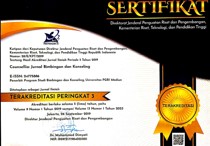Inferiority Feeling Scale: Analisis Validitas Instrumen Menggunakan Rasch Model
DOI:
https://doi.org/10.25273/counsellia.v13i2.15179Keywords:
Validitas, Perasaan Rendah Diri, Rasch Model.Abstract
Downloads
References
Ahmad, H., & Karunia, D. (2017). Pengaruh Teknik Biblio Edukasi Terhadap Rasa Rendah Diri Pada Kelas XI Di SMA Negeri 8 Mataram. Jurnal Realita, 2(1), 194-207. https://doi.org/10.33394/realita.v2i1.743
Andrich, D. Andrich, D. (2010). Rasch Models In International Encyclopedia Of Education. Pergamon, 111-122. https://doi.org/10.1016/B978-0-08-044894-7.00258-X DOI: https://doi.org/10.1016/B978-0-08-044894-7.00258-X
Boone, W. J., Staver, J. R., & Yale, M. S. (2014). Rasch Analysis In The Human Sciences. New York: Springer. DOI: https://doi.org/10.1007/978-94-007-6857-4
Deviana, T., Hayat, B., & Suryadi, B. (2020). Validasi Instrumen Social Provision Scale Pada Siswa Sekolah Menengah Atas: Studi Dengan Penerapan Rasch Model. Indonesian Journal of Educational Assessment, 3(1), 1-15. DOI: https://doi.org/10.26499/ijea.v3i1.54
Djollong, A, F. (2014). Tehnik Pelaksanaan Penelitian Kuantitatif. ISTIQRA’, 2(1), 86-100.
Gunawan, M, A. (2015). STATISTIK PENELITIAN: Bidang Pendidikan, Psikologi dan Sosial. Yogyakarta: Parama Publishing.
Hermawan, I. (2019). Metodologi Penelitian Pendidikan (Kuantitatif, Kualitatif, dan Mixed Methode). Kuningan: Hidayatul Quran Kuningan.
Ibnu, M., Indriyani, B., Inayatullah, H., & Guntara, Y. (2019). Aplikasi Rasch Model: Pengembangan Instrumen Tes Untuk Mengukur Miskonsepsi Mahasiswa Pada Materi Mekanika. Prosiding Seminar Nasional Pendidikan FKIP. Serang: Universitas Sultan Ageng Tirtayasa.
Ilfiandra., dkk. (2022). Development and Validation Peaceful Classroom Scale: Rasch Model Analysis. International Journal of Instruction, 15(4), 497-514. DOI: https://doi.org/10.29333/iji.2022.15427a
Indihadi, D., Suryana, D., & Ahmad, A, B. (2022). The Analysis Of Construct Validity Of Indonesian Creativity Scale Using Rasch Model. Creativity Studies, 15(2), 560–576. https://doi.org/10.3846/cs.2022.15182 DOI: https://doi.org/10.3846/cs.2022.15182
Irma, S., Yusuf, A., & Purwanti, P. Studi Kasus Tentang Perilaku Rendah Diri Pada Peserta Didik. Jurnal Pendidikan dan Pembelajaran Khatulistiwa, 9(1).
Jati, N, I, K. (2017). Pengaruh Konseling Kelompok Untuk Mengurangi Rendah Diri Pada Siswa. (Skripsi, Universitas Muhammadiyah Magelang).
Magdalena, I., Fauziah, S, N., Faziah, S, N., & Nupus, F, S. (2021). Analisis Validitas, Reliabilitas, Tingkat Kesulitan, Dan Daya Beda Butir Soal Ujian Akhir Semester Tema 7 Kelas III SDN Karet 1 Sepatan. BINTANG: Jurnal Pendidikan dan Sains, 3(2), 198-214. https://doi.org/10.36088/bintang.v3i2.1291
Mulyadi, M. (2011). Penelitian Kuantitatif Dan Kualitatif Serta Pemikiran Dasar Menggabungkannya. Jurnal Studi Komunikasi Dan Media, 15(1), 127-138. DOI: https://doi.org/10.31445/jskm.2011.150106
Muntazhimah, M., Putri, S., Khusna, H. (2020). Rasch Model untuk Memvalidasi Instrumen Resiliensi Matematis Mahasiswa Calon Guru Matematika. JKPM (Jurnal Kajian Pendidikan Matematika), 6(1), 65-74. http://dx.doi.org/10.30998/jkpm.v6i1.8144 DOI: https://doi.org/10.30998/jkpm.v6i1.8144
Noviekayati, IGAA., Farid, M., & Amana, L, N. (2021). Inferiority Feeling Pada Remaja Panti Asuhan: Bagaimana Peranan Konsep Diri Dan Dukungan Sosial. Persona: Jurnal Psikologi Indonesia, 10(1), 104-118. https://doi.org/10.30996/persona.v10i1.4826 DOI: https://doi.org/10.30996/persona.v10i1.4826
Panhayuti, P., dkk. (2020). Analisis Pemetaan Kemampuan Numerik Siswa SMK Model Teori Respon Butir. Invotek: Jurnal Inovasi Vokasional Dan Teknologi, 20(3), 11-22. https://doi.org/10.24036/invotek.v20i3.640 DOI: https://doi.org/10.24036/invotek.v20i3.640
Suharman, S. (2018). Tes Sebagai Alat Ukur Prestasi Akademik. At-Ta’dib: Jurnal Ilmiah Pendidikan Agama Islam, 10(1), 93-115.
Sumintono, B., & Widhiarso, W. (2014). Aplikasi Model Rasch Untuk Penelitian Ilmu-Ilmu Sosial. Cimahi: Komunikata Publishing House.
Susdelina, S., Perdana, S, A., & Febrian, F. (2018). Analisis Kualitas Instrumen Pengukuran Pemahaman Konsep Persamaan Kuadrat Melalui Teori Tes Klasik Dan Rasch Model. Jurnal Kiprah 6(1), 41-48. https://doi.org/10.31629/kiprah.v6i1.574 DOI: https://doi.org/10.31629/kiprah.v6i1.574
Taufiq, A., Yudha, E, S., Hapsah, Y., & Suryana, D. (2021). Examining the Supervision Work Alliance Scale: A Rasch Model Approach. The Open Psychology Journal, 14, 179-184. http://dx.doi.org/10.2174/1874350102114010179 DOI: https://doi.org/10.2174/1874350102114010179
Wolfe, W, B. (1999). Alfred Adler: The Pattern Of Life. Oxfordshire: Routledge
Yusuf LN, S. (2016). Konseling Individual KOnsep Dasar & Pendekatan. Bandung: PT Refika Aditama.
Yusuf, S., Budiman, N., Yudha, E, S., Suryana, D., & Yusof, S, M, J, B. (2021). Rasch Analysis of the Indonesian Mental Health Screening Tools. The Open Psychology Journal, 14, 198-203. http://dx.doi.org/10.2174/1874350102114010198 DOI: https://doi.org/10.2174/1874350102114010198
Yusup, F. (2018). Uji Validitas Dan Reliabilitas Instrumen Penelitian Kuantitatif. Jurnal Tarbiyah: Jurnal Ilmiah Kependidikan, 7(1), 17-23. DOI: https://doi.org/10.18592/tarbiyah.v7i1.2100
Downloads
Published
Issue
Section
License
In order to be accepted and published by Counsellia: Jurnal Bimbingan dan Konseling, the author(s) submitting the article manuscript should complete all the review stages. By submitting the manuscript the author(s) agreed to the following terms:
The copyright of received articles shall be assigned to Counsellia: Jurnal Bimbingan dan Konseling. The intended copyright includes the right to publish articles in various forms (including reprints). Counsellia: Jurnal Bimbingan dan Konseling maintain the publishing rights to the published articles.
Authors are allowed to use their articles for any legal purposes deemed necessary without written permission from Counsellia: Jurnal Bimbingan dan Konseling with an acknowledgement of initial publication to this journal.
Author sent the copyright transfer form (here) to the journal.

This work is licensed under a Creative Commons Attribution-NonCommercial-ShareAlike 4.0 International License.






